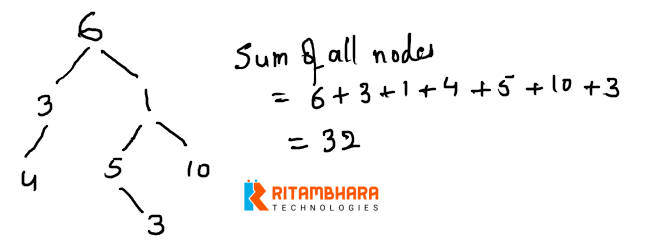Sum of all the nodes in a tree
Given a binary tree, where each node is having an integer value. Write a function that accept the root of this tree and returns the sum of all the nodes in the tree. The sum of all the nodes in the

Solution:
Like other Binary tree questions, this one also use recursion. The signature of our function is:
int sumOfNodes(Node* root);
This function computes the sum of all the node of the binary tree pointer to by root and return that sum. The function can be defined recursively:
Sum of all nodes = Sum of all nodes in left subtree + sum of all nodes in right subtree + data at root
Now we just need to put the terminating condition to this recursion and the final code of function looks like below:
int sumOfNodes(Node* root)
{
if(root == NULL)
{
return 0;
}
else
{
return sumOfNodes(root->left) + sumOfNodes(root->right) + root->data;
}
}
Above implementation is in C++. Below is the sample code in Java with such a function
// DEFINITION OF NODE OF A BINARY TREE
class Node
{
public int data;
public Node left;
public Node right;
public Node(int x){
data = x;
left = right= null;
}
}
// CLASS BINARY TREE. THERE CAN BE MULTIPLE FUNCTION IN THIS CLASS
class BinaryTree
{
Node root;
BinaryTree(){
root= null;
}
//Main function that computes the sum of function
private int sumOfNodes(Node r)
{
if(r == null){ return 0; }
return r.data + sumOfNodes(r.left) + sumOfNodes(r.right);
}
// WRAPPER FUNCTION TO CALL THE ABOVE RECURSIVE FUNCTION
public int sumOfNodes()
{
return sumOfNodes(root);
}
// FUNCTION TO CREATE A TREE WITH SAMPLE NODES
void populateNodes()
{
root = new Node(6);
root.left = new Node(3);
root.right = new Node(1);
root.left.left = new Node(4);
root.right.left = new Node(5);
root.right.right = new Node(10);
root.right.left.right = new Node(3);
}
}
// CLASS WITH main FUNCTION
class RTDemo
{
public static void main(String[] args)
{
BinaryTree tree = new BinaryTree();
tree.populateNodes();
System.out.println(tree.sumOfNodes());
}
}
The function sumOfNodes takes O(n) time.
